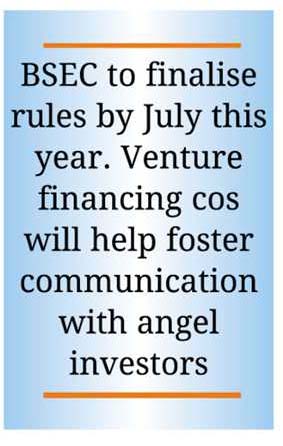The securities regulator is framing rules for a new product namely 'Pink Bond' to cater to the financing need of women entrepreneurs.
Women having innovative business ideas to set up small and medium enterprises will be given access to funds from angel investors under the initiative. In many cases, they fail to get money from conventional sources like banks and financial institutions for being unable to provide collateral.
The rules for issuing pink bonds will be finalised and brought to effect by July this year, according to the Bangladesh Securities and Exchange Commission (BSEC).
The idea of pink bond comes from the well-known practice of wealthy individuals who look out for new ideas and help those turn into profit-making business ventures. They usually do not expect return from any startup until it takes off and starts earning profit.
The motive behind such financing is to promote new entrepreneurs.
"Across the world, up to 60 per cent or more of the projects funded through pink bonds fail to succeed. But the success of the remaining 40 per cent or less of the projects overcomes the loss and ensures the goal is achieved generating high return and creating employment," said BSEC Chairman Prof Shibli Rubayat Ul Islam.
When projects fail, the investors do not demand any return on their investments.
The BSEC chairman said many overseas investors, including some from Singapore, were keen on financing startups in Bangladesh. Some local businesses have already received huge funds from those angel investors.
"Those investors have interest in pink bonds too to promote small women entrepreneurs [in Bangladesh]."
Moreover, the rules that are being framed by the securities regulator will include a provision so that zakat fund, a donation provided by rich people against their wealth, can also be invested in pink bonds.
The BSEC has been assessing the need for funds of the targeted group.
"They [small women entrepreneurs] would need about Tk 0.5-2 million each. Some of the projects one day can turn into big names like Chaldal," said the head of the regulatory body.
Issue managers of the capital market and venture financing companies will facilitate the financing.
After the rules come into effect, women entrepreneurs will be able to collect funds issuing pink bonds.
In that case, issue managers and venture financing companies will receive business proposals and submit those to the securities regulator upon scrutiny.
It is tough for underprivileged female entrepreneurs to get funds from angel investors as the former cannot reach out to the latter. Venture capital companies will play an important role in here by fostering communication with angel investors.
If a project is approved and does take off, the securities regulator will monitor and supervise those.
The BSEC chairman said both foreign and local investors would be able to play the role of angel investor. A local private bank has already stepped forward to support women who need funds for small projects.
Entrepreneurs will have an option of raising a fund together as well and deal with risks collectively.
For example, if six women collect a fund by issuing pink bonds and then one of them fails to pay interest, others will bear the liability.
Shameem Ahsan, president of Venture Capital and Private Equity Association of Bangladesh, said the fund crisis is very acute in the country's SME sector, especially for small women entrepreneurs who are in the industry of handicrafts.
"Definitely, pink bonds will be a very good medium to promote women entrepreneurs. We welcome the move." But there must be transparency in the selection of proposals so that those who deserve a fund are not deprived of it.
Furthermore, funds should be made available for women entrepreneurs who work outside the capital, Mr. Ahsan said, adding that "They will need training so that they can properly manage funds raised through pink bonds."
Source: The Financial Express
